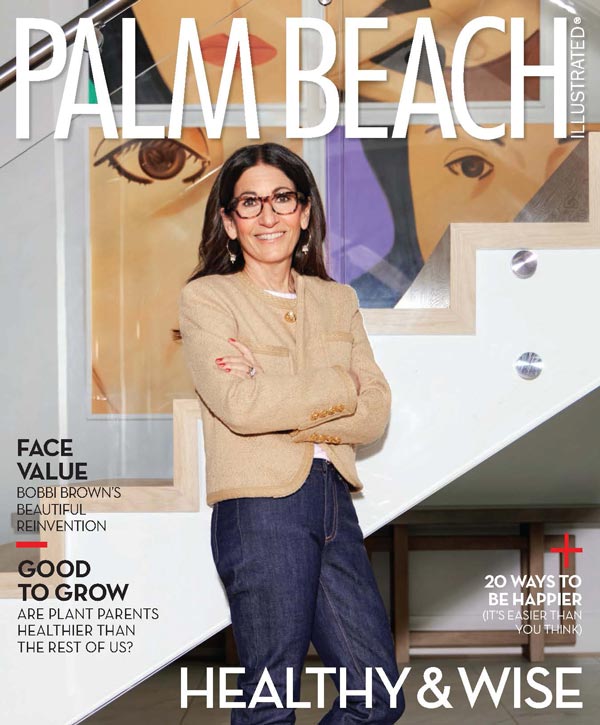
PBI is pleased to present a series of Q&As with Black leaders making a difference in the community. To read more, click here.
Patrick Livingston credits his experience in the restaurant industry with bringing him to Palm Beach County and preparing him for his current role as founder of Arms of Hope Community Inc. The Lake Worth–based nonprofit aims to provide practical aid to those in need, including food services and employment training and opportunities.
For his part, Livingston personally understands the benefit of a helping hand and a strong work ethic. Originally from Kingston, Jamaica, Livingston relocated to the United States with his mom and recalls watching her work two or three jobs just to make ends meet. He notes that he and his siblings began chipping in at an early age, and he believes that responsibility taught him valuable life lessons, such as to always be willing to put in the hard work and to not set barriers on his potential. “I know the system is set up where it’s not balanced, but that doesn’t mean that the game is over,” he says. “When you don’t have that winning attitude, then it becomes a struggle.”
In his role at Arms of Hope, Livingston aims to restore that hope and winning attitude to those who have found themselves facing hard times. In addition to aid from Healthier Lake Worth, he credits the city of Lake Worth with stepping up to help him and the Arms of Hope team expand their impact on the community. PBI recently caught up with Livingston to talk about the organization and his thoughts on leadership.
PBI: Can you describe the mission of Arms of Hope Community Inc.?
Livingston: Our mission is to feed folks, educate them, and help them get to the next level in life. A lot of the time, people think nonprofits or organizations like ours are only there to help the homeless or the disenfranchised, but no. We’re there for the single moms who are working extra hours and don’t have time to do all the things they need to do to have a functioning home. Whether they are worrying about food or how much they’re earning, we help with training and mentoring. Whatever they’re spending on groceries each week, we try to take that away so that they can use it for their expenses or some form of savings that they can fall back on. Sometimes, people can feel like they’re living like a hamster on a wheel, where they’re just going around and around in circles. We want to be able to provide the type of assistance for them so that they don’t feel like that anymore.
Are most of the people you help from Lake Worth?
No. We serve folks from as far south as Boca and Fort Lauderdale, as far north as Port St. Lucie, and as far west as Royal Palm and The Acreage. These people have hit tough spots. I’ll give you a perfect example. We had a retired couple who faced some medical challenges and were hit with excessive medical fees, so they stopped eating. They stopped eating in order to save the husband’s life. Then their neighbor told her about us, and she came over and gave us a try. During the three or four months while they were going through their struggle and trying to get back to normal, they were getting their groceries from us, and we were helping them to maintain a healthy lifestyle. Afterward, they came back and said, “Thank you so much. You kept us going, and now we’re caught up with all of our medical expenses and we want to volunteer.” She’s been with us now for about two or three years.
I bet you see a lot of people you’ve helped through hard times return to pay it forward.
Absolutely. They just love to be a part of it because they know how much it has meant for them during their time of struggle. Of course, there are those with mental health challenges who are not going to get off of the system no matter what; without the proper medication and treatment and housing for them, they’re going to remain that way because there’s nothing to advance them in their situation. Those cases are more challenging. And, those who’ve been off of the grid for a long time are equally challenging; they know how to survive without the normalcy of paying their bills and worrying about working and stuff like that. Those two instances are more of a challenge, so we try to focus a lot on those who are just newly in need and trying to get back, and also those who are on the verge. We try to catch them before they go homeless and things like that to see what we can do, because it takes a lot less to stop it right where they are, as opposed to starting all over again.
How has COVID-19 impacted the work you all are doing?
It’s a different world. We used to, on average, serve about 200 people each time, and each one represented about three or four family members. Now we’re up to serving closer to 400, so you’re easily talking about 800 or 900 family members. And with COVID layoffs, so many people still haven’t gotten their unemployment, and whatever resources were carrying them through are practically burnt out now. When they pull in for drive-up service these days, you see all kinds of good cars, so you can tell that it’s affecting everyone.
When you say serving, is this with hot meals or food pantry aid?
They’re getting both. We have a lot of homeless folks who will just take the hot meal or some sandwiches and things like that because they can’t cook or store. Then you have those who still have a roof over their head, so they’re going to take their care package as well as some meals so that they don’t have to worry about trying to cook for that day.
What do you feel has been your proudest achievement thus far in your work with Arms of Hope?
I’m really a simple person, so there are a lot of simple little things that make me proud. I guess the biggest thing was finally getting the city to understand and to be willing to work with us to have a truthful impact for the community. That is awesome. I’m now sitting down and talking with city commissioners and leaders, and they’re reaching out to me for help with the community. So, for me, that’s tremendous because that means we’re breaking ground. And to hear them say they’re going to celebrate holidays such as Juneteenth and other national holidays and potentially designate an area around where we are for the celebrations is great.
Also, where we are on Wingfield Street, there’s a wall there that has segregated the community. It’s a big wall and it hasn’t been touched for years and years. We recently had a conversation where we decided to do something with it. We’re going to fix it up, paint it, and try to put a mural on it. We want to change the stigma but not forget it. We’ll put a small area there and explain what the wall stood for in the past, and then come up with something new for what the wall stands for now, which is inclusivity and working together and trying to be the best community that we can be.
What is your guiding philosophy as a leader?
I always say that there’s nothing that I would ask you to do that I wouldn’t do for myself. I always treat others the way I want to be treated or expect to be treated. And you should always extend the hand out first before asking somebody for something. When I was training my staff, managers, I always asked them, what can I do for you to make your life easier? We all have our own struggles, and if you meet them where they are and help them out, they feel committed to you because you’ve lifted that burden off of them. So, you’ll get twice the value out of them when you do things like that.
What words of wisdom would you share with young people who are looking to make a difference in their communities?
You have to take interest in where you live. You have to take interest in making sure everyone around you is safe and healthy. If the young folks are not doing that, then we’re going to continue perpetuating that cycle. They have to get their hands in something positive, because otherwise they’re not doing what they’re supposed to do and that doesn’t make a healthy community. We have to encourage the young folks to get out there and do some kind of community service and get involved and give back to the community. When you see that, that’s when the community starts to change in a positive way.
*This interview has been edited and condensed.










Facebook Comments